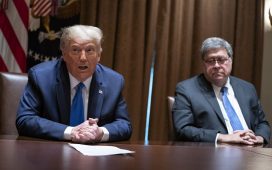Former Reynolds and Reynolds Co. CEO Bob Brockman, who is charged with the largest criminal tax evasion case by an individual in the U.S., asked a judge to lift an IRS demand that he pay $1.4 billion in taxes and penalties.
The IRS has improperly imposed a so-called jeopardy assessment, which is normally used when a taxpayer is “designing quickly” to leave the country and place assets beyond the reach of U.S. authorities, or when the taxpayer faces insolvency, Brockman’s lawyers said in a Houston federal court filing Friday. None of those conditions applies to Brockman, they said.
“No exigency exists here,” attorneys said in the court filing. “There is no jeopardy. The IRS’s actions were baseless and wholly unreasonable, and must be immediately abated.”
They asked that a judge rule on their motion within 20 days.
The filing expands on a lawsuit Brockman filed Thursday, and it denies key allegations that are also central to an indictment accusing him of evading taxes on $2 billion in income. Brockman was indicted in October 2020 on charges of tax evasion, wire fraud, money laundering and evidence tampering in what federal prosecutors allege was an elaborate offshore scheme over two decades. He has pleaded not guilty.
Brockman, 80, who was chairman and CEO of the privately held dealership management system giant until he stepped down in November 2020, says he has dementia and is not competent for trial. Prosecutors say he’s faking. A judge who held an eight-day hearing on the matter in November has yet to rule.
The indictment alleges Brockman controlled a Bermuda charitable trust with billions of dollars of assets and didn’t pay taxes on them. Brockman’s lawyers said the trust owns entities that control the software firm, Reynolds and Reynolds, which is valued at $5 billion.
The IRS hasn’t alleged that “anyone has taken any action to conceal, dissipate, transfer, or in any way diminish the value of Reynolds,” Brockman’s attorneys wrote in a court filing. “In other words, based on the IRS’s theory that Mr. Brockman is the owner of Reynolds, there are assets worth a multiple of the asserted tax liability that are and will remain available in the United States.”
That means the IRS can’t say that “collection would be jeopardized” if it prevails on the taxes owed, Brockman’s attorneys said.
A Justice Department spokeswoman declined to comment to Automotive News beyond court filings. The government had not yet responded to the lawsuit as of Monday.
Brockman’s attorneys did not respond to a request for comment by Automotive News.
The case is Brockman v. United States of America, 22-cv-202, U.S. District Court, Southern District of Texas (Houston).
Automotive News Reporter Lindsay VanHulle contributed to this report.







